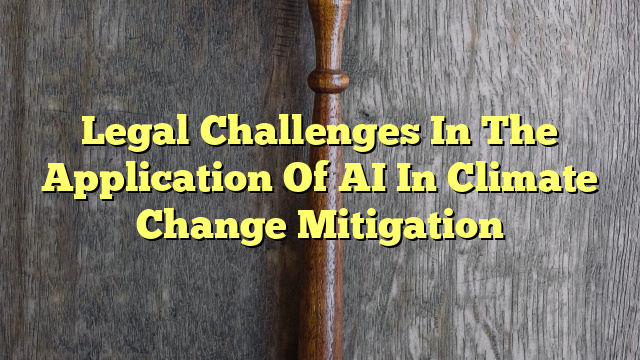Table of Contents
Legal Challenges Associated with Artificial Intelligence
Artificial intelligence (AI) presents various legal challenges when applied to climate change mitigation. One of the key challenges is the issue of liability. As AI systems become more autonomous and make decisions that impact climate change strategies, it becomes difficult to determine who should be held responsible for any negative consequences. Should it be the developers of the AI system, the operators, or the AI system itself?
Another legal challenge is the protection of intellectual property rights. AI technologies often involve complex algorithms and data analysis, which may be considered proprietary. However, in the context of climate change mitigation, it is crucial to ensure that AI technologies are accessible and can be used by multiple stakeholders to address the global challenge effectively.
Furthermore, privacy and data protection issues arise when AI systems collect and analyze large amounts of data for climate change modeling and prediction. Ensuring compliance with data protection regulations while harnessing the power of AI for climate change mitigation is a significant legal challenge.
Ethical Issues of AI in Climate Change
In addition to legal challenges, there are ethical issues associated with the application of AI in climate change mitigation. One of the main concerns is the potential for AI systems to reinforce existing inequalities. If AI technologies are predominantly developed and controlled by certain countries or corporations, it may exacerbate global disparities in addressing climate change.
Another ethical issue is the transparency and explainability of AI systems. As AI becomes more complex and autonomous, it becomes challenging to understand how decisions are made. This lack of transparency raises concerns about accountability and the potential for biased or discriminatory outcomes in climate change strategies.
Additionally, there is an ethical debate around the use of AI for climate change adaptation versus mitigation. Some argue that AI should primarily focus on reducing greenhouse gas emissions and transitioning to sustainable energy sources, while others emphasize the importance of using AI for adaptation measures to protect vulnerable communities from the impacts of climate change.
Challenges of AI Regulation
Regulating AI in the context of climate change mitigation poses several challenges. Firstly, there is a lack of international consensus on AI regulations. Different countries have varying approaches to AI governance, which can hinder global cooperation and coordination in addressing climate change.
Secondly, the rapid pace of AI development makes it difficult for regulatory frameworks to keep up. Traditional legal systems may struggle to adapt to the unique challenges posed by AI technologies, requiring innovative approaches to regulation.
Lastly, striking the right balance between encouraging innovation and ensuring responsible AI use is a challenge. Overregulation may stifle technological advancements, while underregulation may lead to unintended consequences and potential harm to the environment and society.
Challenges of Climate Change Mitigation
Climate change mitigation itself presents significant challenges that intersect with the application of AI. These challenges include transitioning to renewable energy sources, reducing greenhouse gas emissions, and implementing sustainable land-use practices.
AI can play a crucial role in addressing these challenges by optimizing energy systems, improving climate modeling and prediction, and enhancing resource management. However, the effectiveness and equitable distribution of AI solutions in climate change mitigation remain key challenges.
Ensuring that AI technologies are accessible, affordable, and beneficial to all countries and communities is essential to avoid exacerbating existing inequalities and achieving global climate goals.


AI can be a great solution to climate change, but legal challenges must be considered.